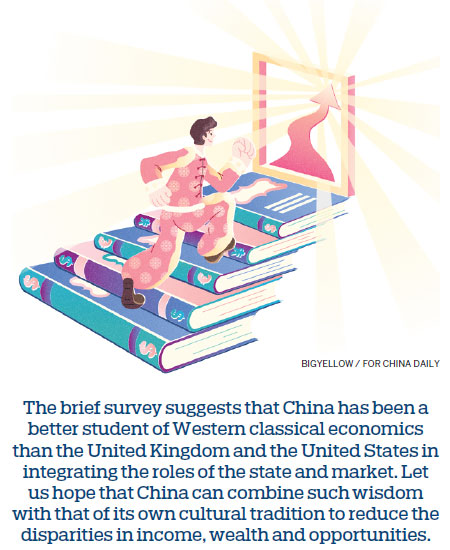Careful balancing act
China is proving exemplary in integrating the roles of the state and market
The long recession following the 2008 financial crisis has prompted critical examinations of the Efficient Market Hypothesis and Rational Expectation Theory. These two doctrines form the foundation of neoliberal macroeconomics. They claim that the market is the best mechanism for setting prices, allocating resources, providing information, and driving growth and development, and that government should play a minimal role in the economic life of a country, as government intervention only distorts the market.
Under the influence of this neoliberal thinking, the market has vastly expanded its role and has taken over certain vital functions of the state including the provision of public goods such as healthcare, education and even security. However, private corporations, by their very nature, are not the best agencies to act as providers of public services.

Fortunately, there are some countries where market fundamentalism does not rule supreme and where the state plays an important role in the economy. The story of South Korea's successful developmental is well documented. Another case is China which has for a few decades experienced double-digit economic growth. China, South Korea and most countries in East Asia pursue pragmatic economic policies which combine the market mechanism with state intervention. Instead of being taboos, five-year plans and industrial policies are part and parcel of their governance tool kits.
The Great Recession and the economic performance of countries such South Korea and China should prompt the West to revisit the economic thinking of the past.
As early as 2,300 years ago, the Greek philosophers Plato and Aristotle insisted that economic development should be embedded in social development. The role of economic activity was to promote the well-being of the citizens of a just and harmonious community. In other words, economic development should serve social development. This ancient Greek tradition informs the works of economists such as Adam Smith, John Stuart Mill, Alfred Marshall and Arthur Pigou. While they worked to uncover the mechanism of creating economic wealth, they never neglected the issue of social welfare and the role of the state in dealing with market failures.
Smith's The Wealth of Nations is more well-known than his earlier book The Theory of Moral Sentiments. But the two books must be read together. In The Theory of Moral Sentiments, Smith examined the strong need for actions based on values that go well beyond profit seeking. While he wrote that prudence was the virtue most useful to the individual, he insisted that humanity, justice, generosity, and public spirit were the qualities most useful to others. In his various writings he expressed deep concerns about moral issues and social justice, the fate of the poor and the disadvantaged. Moreover, he was conscious of the limitations of the market.
Smith's famous metaphor of the invisible hand has led to the misconception that he rejected state intervention. This is unfortunate. He rejected only state interventions in economies that exclude the market, but not interventions in economies that include the market. State intervention can do important things that the market may leave undone.
Mill continued Smith's concept of embedding the economy in society. He did not believe that individual and the collective are mutually exclusive. He justified, from a utilitarian perspective, the rationality of individual behavior motivated by feelings of humanity and solidarity. He allowed for departure from the laissez faire principle. He accepted the principle of state intervention in the economy such as regulating the length of the working day, and assistance to the poor. Though he supported private property and the rights of individuals to possess the products of their own labor, he criticized the abuses of such rights, especially the glaring inequality in wealth distribution.
Mill's ideas were further developed by Marshall, who rejected the view that the only way to improve the conditions of the poor was to stimulate the egoism of the rich. Marshall tried to reconcile a moderate laissez faire approach with a reformist program. The social-political dimension of human action should always be taken into account by economists. This formed the conceptual and moral basis for state intervention. The state had the right and duty to intervene in the economic sphere, to regulate the market mechanism and to correct its distortions. The argument was explicitly and strongly expressed in The Social Possibilities of Economic Chivalry. He advocated the introduction of corrective mechanisms such as cooperative movements, profit-sharing, arbitration on wages and similar mechanisms into the English political economic system. His thinking laid the foundation for welfare economics.
Marshall's study of social welfare was continued by Pigou who succeeded him as professor of economics at Cambridge University. Pigou's major work The Economics of Welfare, brought welfare economics into the scope of economic analysis. He was responsible for the distinction between private and social marginal products and costs. He originated the idea that governments could, via a mixture of taxes and subsidies, correct market failures. To honor his contribution in this area, the term Pigovian taxes was coined to mean taxes used to correct negative externalities.
The brief survey suggests that China has been a better student of Western classical economics than the United Kingdom and the United States in integrating the roles of the state and market. Let us hope that China can combine such wisdom with that of its own cultural tradition to reduce the disparities in income, wealth and opportunities.
The author is a retired professor and the author of Global Financial Crisis and Challenges for China. The author contributed this article to China Watch, a think tank powered by China Daily. The views do not necessarily reflect those of China Daily.
(China Daily Global 05/16/2019 page13)


















